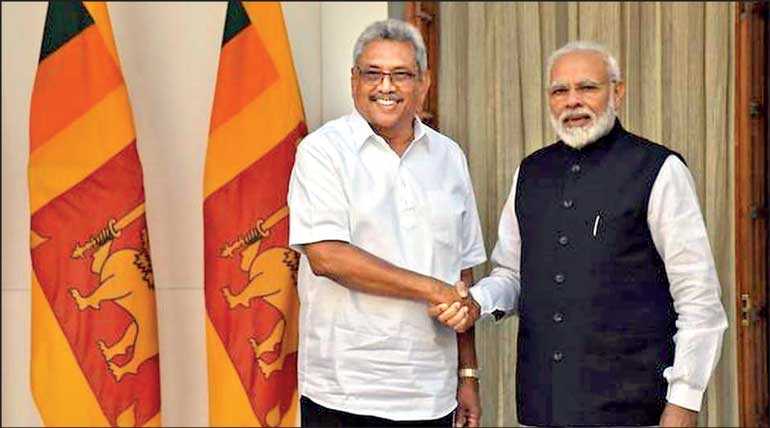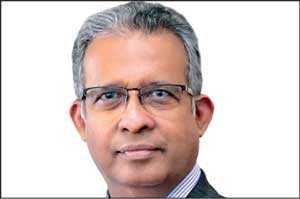Monday Feb 16, 2026
Monday Feb 16, 2026
Saturday, 1 August 2020 00:02 - - {{hitsCtrl.values.hits}}

Prime Minister Narendra Modi with Sri Lankan President Gotabaya Rajapaksa ahead of their bilateral meeting at Hyderabad House in New Delhi, on 29 November 2019 – File Photo Credit: V.V. Krishnan
 By Prasad Kariyawasam
By Prasad Kariyawasam
The dawn of the technological revolution made the world change rapidly, with concurrent global growth engine shifts towards Asia. And now the COVID-19 pandemic has abruptly disrupted almost every aspect of economies, forcing the world to pause and catch its breath. This is an opportune time for the leaders of Sri Lanka and India to introspect and nourish the roots of the relationship aimed at thriving again, using modern toolkits, but leveraging age-old wisdom and experience in the region.
The people of the Indian subcontinent are heirs to ancient civilisations. Since humans are driven by mind as much as their biology, historical experiences too can guide how current challenges can be addressed and opportunities harnessed for the wellbeing of people in our ever evolving world.
The unique Indo-Lanka relationship, de jure, is between equals as sovereign nations. But it’s asymmetric in terms of geographic size, population, military and economic power, on the one hand, and social indicators and geographical location, on the other. It is steeped in myth and legend, and influenced by multiple religious, cultural and social affinities, all serving as the ballast for the relationship, that require careful guidance.
The multi-layered population of Sri Lanka, though regularly influenced by India throughout history, remains steadfastly independent, preserving a distinct character, which even the British recognised by administering Sri Lanka as a separate entity from British India during the colonial era.
History reveals that the advent of Buddhism to Sri Lanka during the time of Emperor Asoka was not a sudden event in isolation but the result of cross border discourse preceding this event. For several centuries in the first millennia, the ancient capital city of Anuradhapura housed an international community which included traders from India, China, Rome, Arabia and Persia. And Sri Lankan Ambassadors visited imperial Rome. The erudite Indian monk Buddhagosha spent years in Anuradhapura during the fifth century, codifying Buddhist scriptures. Buddhist monks from Sri Lanka travelled to India, China, Cambodia and Java leaving behind inscriptions.
In later years, in the first millennia, invasions from southern Indian kingdoms generated fear perceptions that are exploited up to this day by some in Sri Lanka, yet, people-to-people interaction with South India as well as other parts of India have been, and remain strong. Buddhist temples have incorporated and continue to contain shrines for Hindu deities. Sri Lankan kingdoms also came under pressure from Chinese naval expeditions seeking tribute and obedience.
The colonial expansion of European maritime nations had a direct political, economic and cultural impact on Sri Lanka and the economy was reshaped, just like in India. Labour from Southern India was brought to Sri Lanka in large numbers to work in plantations. The long drawn freedom struggle of India had its influence on Sri Lanka as well. There was cross border support, drawing strength from each other for the revival of culture, tradition, local languages, spiritual practices and philosophies and education. Both countries transformed into modern nations with constitutional and institutionalised governance under colonial rule.
Although globalisation in its current shape and substance is considered a new phenomenon, careful examination of historical relations between the two countries reveals that most aspects of today’s globalisation existed in a different form in the pre-colonial era with free exchange of ideas, trade and intellectual discourse, contributing towards a robust economic and just social dispensation.
However, process engineering by colonial powers for identification and categorisation of people was a factor in the emergence of separatist ideologies based on ethnicity, language and religion. This mindset is now ingrained and accentuated in politics, contravening what is common among South Asians based on years of collective experience and value systems like Asokan principles of governance. Episodic and complicated instances of communal hostility, even those incidents that took place thousands of years ago, are referenced often to suit tactical political gain, exacerbating current communal tension.
The phenomena of communal nationalism is not unique to South Asia and are now affecting more countries in the world including the West, often neglecting provisions of the Universal Declaration of Human Rights. Policies and thinking are becoming communally exclusive, localised and inward-looking, often replete with ostensible suspicions against international cooperation, trade and mutually productive engagement.
Sri Lanka’s strategic location, which a prominent Indian commentator once likened to an aircraft carrier stationed at the southern tip of India, makes it apparent that not only economic fortunes but the security of both countries are inextricably linked, just as in ancient times. Therefore it is heartening that as Emperor Asoka did, leaders of modern India and Sri Lanka constantly strive for excellence in neighbourly relations, no doubt recognising that a calamity in one country can adversely impact the other, given vibrant economic, cultural and security links
The COVID-19 pandemic hit the world in this backdrop, engendering unprecedented turmoil, allowing opportunity for some leaders to double down on insular thinking, ostensibly for providing local communities with better economic and social prospects, and security. South Asia seems not immune from this malaise.
The modern world has been shaped by countries that engendered the industrial and technological revolution, leveraging its capacity not only for economic domination but for military superiority as well. In fact the composition of the UN Security Council too reflects this reality. Despite various predictions to the contrary, the United States still remains the pre-eminent economic and military power based on its immense naval superiority and strength of its currency, and dominates a global alliance system that includes several strong Asian economies too. The rise of Asian giants like China with its massive industrial capacity, and India with its immense latent potential proven by its history, have stimulated a myriad strategic complications and options for countries in Asia. Meanwhile, governance models favoured by nations keep vacillating between fundamental freedoms based democratic systems and quasi democratic, socialist authoritarian systems. In this regard, the people of Sri Lanka and India have been served well by long years of uninterrupted democratic governance that regularly tests the will of the people. This has provided long-term stability for both countries and must not be vitiated.
Sri Lanka’s strategic location, which a prominent Indian commentator once likened to an aircraft carrier stationed at the southern tip of India, makes it apparent that not only economic fortunes but the security of both countries are inextricably linked, just as in ancient times. Therefore it is heartening that as Emperor Asoka did, leaders of modern India and Sri Lanka constantly strive for excellence in neighbourly relations, no doubt recognising that a calamity in one country can adversely impact the other, given vibrant economic, cultural and security links.
Though robust partnerships with countries near and far must be sought in line with the long held non-alliance foreign policies of both countries, such efforts must be bounded by an atmosphere needed for peace and prosperity in both countries and for stability in the Indian Ocean. Among others, freedom of navigation in the Indo-Pacific together with a rules based international order and peaceful settlement of disputes, especially related to the blue economy are of common interest.
While avoiding advocacy of zero sum solutions on crucial local or international issues, both countries must regularly seek to harmonise strategic and other interests in line with long held common values and socio economic compulsions.
In modern times too, the socio-economic development of Sri Lanka has remained substantially and often dependently linked to India. But there are many options available for both countries to address issues of imbalance and asymmetries. For instance, Sri Lanka can encourage Indian entrepreneurs to make Colombo another business hub for them, as logistical capacities and facilities for rest and recreation, as well as ease of doing business, keep improving in Sri Lanka. Integrating the two economies but with special and differential treatment for Sri Lanka due to economic asymmetries can be fast-tracked for this purpose.
And there is immense potential to accentuate or create complementariness, using locational and human resource potentials, for harnessing benefits for both countries in the modern value chains. For facilitation and confidence building towards these ends, as ancients did, it’s essential to create a plethora of robust partnerships across the economic and social spectrum that promote people-to-people bonhomie. And engagement of legislatures, both at national and state/provincial level are essential for promoting multi-party support and mobilising people to appreciate the efficacy of greater integration for the long term wellbeing and sustenance of bilateral relations.
With many countries receding into cocoons due to the COVID-19 pandemic and expatriates returning in droves, maximising mutual support and leveraging opportunities in the neighbourhood appear as a viable option for the immediate wellbeing of people. This is, in many ways an opportunity for both countries to reflect and draw from positive experiences, examples and values, focusing on the renewal and revitalisation of partnerships taking into consideration modern value chain and security compulsions, with the recognition that prosperity of one country will engender progress for the other and vice versa.
(Prasad Kariyawasam is Sri Lanka’s former Foreign Secretary and was High Commissioner to India.)
(An edited version of this piece appeared in The Hindu on 28 July 2020.)